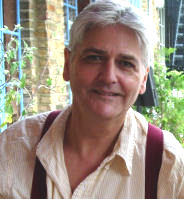Cognitive Mapping and Radio Drama by Alan Beck - Consciousness, Literature and the Arts, Volume 1 Number 2, July 2000
also at http://blackboard.lincoln.ac.uk/bbcswebdav/users/dmeyerdinkgrafe/archive/cog.html
SECTION 4
4.1 Referentiality
My discussion is also crucially about the final stage of a text's reception, in the mind of the reader. So I am concerned here with the fictions of radio drama and the connections these make with the listener's own real-life interaction, the Lifeworld - the listener's own existential situation; and also how radio represents the Lifeworld or what I term the 'extra-radio world'. This article looks at how the listener actively completes the fictional scenery from the necessarily sketchy information given in broadcast, in the 'blind' medium.
The term for this making of connections by the reader is referentiality, as I introduced above. It is the act of making reference, in a work of fiction, to the extraneous world outside, and to various objects or referents, believed to exist independently, outside the realm of the fiction. It is how the fiction work points outside of itself. I take the common-sense attitude that real objects exist independently of their being observed (metaphysical realism) and that, unless problematized by an author such as Samuel Beckett, referentiality is possible.
4.2
Referentiality is also used in linguistics to mean the relationship between words and the objects that the words represent. As a term, it is more familiar in study of the novel, and it is not established in theatre studies, and it has come to the fore recently in countering structuralist and poststructuralist views of the text as a closed, self-contained system (the prison-house of language). It is now possible to argue that literature is not closed off from the world outside of it, and so to take a stance against radically nominalist assumptions found in post?Saussurean critics. But in this postmodern 'moment', we are meant to be free of such master-narrative dogmatics.
So this article is but one aspect of the overall referential dimension of the radio play, and indeed, of literature. How does radio drama evoke coherent, recognisable worlds for the listener? What is the relationship between radio fictions and reality, and on right through to the listener, to how the fictional world becomes 'concretized' (Roman Ingarden's term, Ingarden 1973) in the imagination and becomes applied to the listener's own existential situation.
In particular, I will be examining how the radio 'mise en scène' takes its part in generating the fictional world. I will not, however, be considering how referentiality has been problematized by certain radio dramatists (Tyrone Guthrie, Samuel Beckett, Howard Barker, Barry Bermange, and Lucy Gough, for example).
TO - SECTION 5 - Phenomenology, Reception theory

Academic material on this site is  Alan Beck
is licensed under a Creative Commons Attribution-Non-Commercial-Share
Alike 2.0 UK: England & Wales License.
Alan Beck
is licensed under a Creative Commons Attribution-Non-Commercial-Share
Alike 2.0 UK: England & Wales License.
See more of Alan Beck's work.
To the WELCOME PAGE for Alan Beck's site.
Learn about radio drama on this site along with my book - Beck, Alan, Radio Acting, London: A & C Black ISBN 0-7136-4631-4
Available on Amazon. CLICK HERE.
Any opinions expressed in this site are the personal opinions of the owner of the site. IF YOU HAVE COMMENTS, PLEASE EMAIL TO : [email protected]
